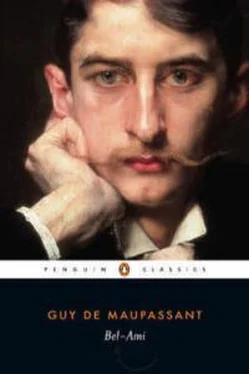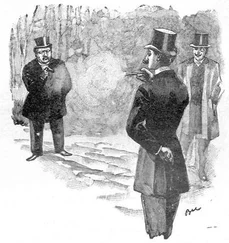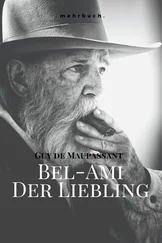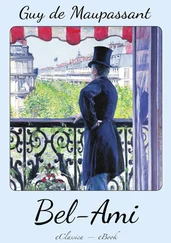The young woman rose and said simply: "Let us go into the garden. We must not listen to his secrets."
They seated themselves upon a bench before the door, beneath a blossoming rosebush. After several moments of silence Duroy asked: "Will it be some time before you return to Paris?"
"No," she replied; "when all is over, I will go back."
"In about ten days?"
"Yes, at most."
He continued; "Charles has no relatives then?"
"None, save cousins. His father and mother died when he was very young."
In the course of a few minutes, the servant came to tell them that the priest had finished, and together they ascended the stairs. Forestier seemed to have grown thinner since the preceding day. The priest was holding his hand.
"Au revoir, my son. I will come again to–morrow morning"; and he left. When he was gone, the dying man, who was panting, tried to raise his two hands toward his wife and gasped:
"Save me—save me, my darling. I do not want to die—oh, save me—go for the doctor. I will take anything. I do not want to die." He wept; the tears coursed down his pallid cheeks. Then his hands commenced to wander hither and thither continually, slowly, and regularly, as if gathering something on the coverlet. His wife, who was also weeping, sobbed:
"No, it is nothing. It is only an attack; you will be better to–morrow; you tired yourself with that drive."
Forestier drew his breath quickly and so faintly that one could scarcely hear him. He repeated:
"I do not want to die! Oh, my God—my God—what has happened to me? I cannot see. Oh, my God!" His staring eyes saw something invisible to the others; his hands plucked continually at the counterpane. Suddenly he shuddered and gasped: "The cemetery—me—my God!" He did not speak again. He lay there motionless and ghastly. The hours dragged on; the clock of a neighboring convent chimed noon.
Duroy left the room to obtain some food. He returned an hour later; Mme. Forestier would eat nothing. The invalid had not stirred. The young woman was seated in an easy–chair at the foot of the bed. Duroy likewise seated himself, and they watched in silence. A nurse, sent by the doctor, had arrived and was dozing by the window.
Duroy himself was almost asleep when he felt a presentiment that something was about to happen. He opened his eyes just in time to see Forestier close his. He coughed slightly, and two streams of blood issued from the corners of his mouth and flowed upon his night robe; his hands ceased their perpetual motion; he had breathed his last. His wife, perceiving it, uttered a cry and fell upon her knees by the bedside. Georges, in surprise and affright, mechanically made the sign of the cross.
The nurse, awakening, approached the bed and said: "It has come." Duroy, recovering his self–possession, murmured with a sigh of relief: "It was not as hard as I feared it would be."
That night Mme. Forestier and Duroy watched in the chamber of death. They were alone beside him who was no more. They did not speak, Georges's eyes seemed attracted to that emaciated face which the flickering light made more hollow. That was his friend, Charles Forestier, who the day before had spoken to him. For several years he had lived, eaten, laughed, loved, and hoped as did everyone—and now all was ended for him forever.
Life lasted a few months or years, and then fled! One was born, grew, was happy, and died. Adieu! man or woman, you will never return to earth! He thought of the insects which live several hours, of the feasts which live several days, of the men who live several years, of the worlds which last several centuries. What was the difference between one and the other? A few more dawns, that was all.
Duroy turned away his eyes in order not to see the corpse. Mme. Forestier's head was bowed; her fair hair enhanced the beauty of her sorrowful face. The young man's heart grew hopeful. Why should he lament when he had so many years still before him? He glanced at the handsome widow. How had she ever consented to marry that man? Then he pondered upon all the hidden secrets of their lives. He remembered that he had been told of a Count de Vaudrec who had dowered and given her in marriage. What would she do now? Whom would she marry? Had she projects, plans? He would have liked to know. Why that anxiety as to what she would do?
Georges questioned himself, and found that it was caused by a desire to win her for himself. Why should he not succeed? He was positive that she liked him; she would have confidence in him, for she knew that he was intelligent, resolute, tenacious. Had she not sent for him? Was not that a kind of avowal? He was impatient to question her, to find out her intentions. He would soon have to leave that villa, for he could not remain alone with the young widow; therefore he must find out her plans before returning to Paris, in order that she might not yield to another's entreaties. He broke the oppressive silence by saying:
"You must be fatigued."
"Yes, but above all I am grieved."
Their voices sounded strange in that room. They glanced involuntarily at the corpse as if they expected to see it move. Duroy continued:
"It is a heavy blow for you, and will make a complete change in your life."
She sighed deeply, but did not reply. He added:
"It is very sad for a young woman like you to be left alone." He paused; she still did not reply, and he stammered: "At any rate, you will remember the compact between us; you can command me as you will. I am yours."
She held out her hand to him and said mournfully and gently: "Thanks, you are very kind. If I can do anything for you, I say too: 'Count on me.'"
He took her proffered hand, gazed at it, and was seized with an ardent desire to kiss it. Slowly he raised it to his lips and then relinquished it. As her delicate fingers lay upon her knee the young widow said gravely:
"Yes, I shall be all alone, but I shall force myself to be brave."
He did not know how to tell her that he would be delighted to wed her. Certainly it was no time to speak to her on such a subject; however, he thought he might be able to express himself by means of some phrase which would have a hidden meaning and would infer what he wished to say. But that rigid corpse lay between them. The atmosphere became oppressive, almost suffocating. Duroy asked: "Can we not open the window a little? The air seems to be impure."
"Certainly," she replied; "I have noticed it too."
He opened the window, letting in the cool night air. He turned: "Come and look out, it is delightful."
She glided softly to his side. He whispered: "Listen to me. Do not be angry that I broach the subject at such a time, but the day after to–morrow I shall leave here and when you return to Paris it might be too late. You know that I am only a poor devil, who has his position to make, but I have the will and some intelligence, and I am advancing. A man who has attained his ambition knows what to count on; a man who has his way to make does not know what may come—it may be better or worse. I told you one day that my most cherished dream was to have a wife like you."
"I repeat it to you to–day. Do not reply, but let me continue. This is no proposal—the time and place would render it odious. I only wish to tell you that by a word you can make me happy, and that you can make of me as you will, either a friend or a husband—for my heart and my body are yours. I do not want you to answer me now. I do not wish to speak any more on the subject here. When we meet in Paris, you can tell me your decision."
He uttered these words without glancing at her, and she seemed not to have heard them, for she stood by his side motionless, staring vaguely and fixedly at the landscape before her, bathed in moonlight.
At length she murmured: "It is rather chilly," and turned toward the bed. Duroy followed her. They did not speak but continued their watch. Toward midnight Georges fell asleep. At daybreak the nurse entered and he started up. Both he and Mme. Forestier retired to their rooms to obtain some rest. At eleven o'clock they rose and lunched together; while through the open window was wafted the sweet, perfumed air of spring. After lunch, Mme. Forestier proposed that they take a turn in the garden; as they walked slowly along, she suddenly said, without turning her head toward him, in a low, grave voice:
Читать дальше











